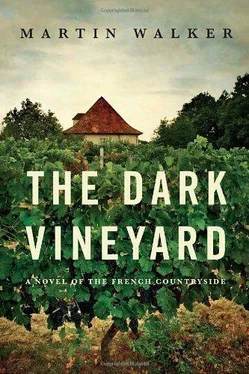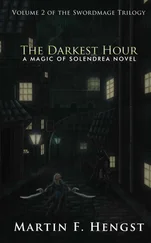Martin Walker - The dark vineyard
Здесь есть возможность читать онлайн «Martin Walker - The dark vineyard» весь текст электронной книги совершенно бесплатно (целиком полную версию без сокращений). В некоторых случаях можно слушать аудио, скачать через торрент в формате fb2 и присутствует краткое содержание. Жанр: Полицейский детектив, на английском языке. Описание произведения, (предисловие) а так же отзывы посетителей доступны на портале библиотеки ЛибКат.
- Название:The dark vineyard
- Автор:
- Жанр:
- Год:неизвестен
- ISBN:нет данных
- Рейтинг книги:5 / 5. Голосов: 1
-
Избранное:Добавить в избранное
- Отзывы:
-
Ваша оценка:
- 100
- 1
- 2
- 3
- 4
- 5
The dark vineyard: краткое содержание, описание и аннотация
Предлагаем к чтению аннотацию, описание, краткое содержание или предисловие (зависит от того, что написал сам автор книги «The dark vineyard»). Если вы не нашли необходимую информацию о книге — напишите в комментариях, мы постараемся отыскать её.
The dark vineyard — читать онлайн бесплатно полную книгу (весь текст) целиком
Ниже представлен текст книги, разбитый по страницам. Система сохранения места последней прочитанной страницы, позволяет с удобством читать онлайн бесплатно книгу «The dark vineyard», без необходимости каждый раз заново искать на чём Вы остановились. Поставьте закладку, и сможете в любой момент перейти на страницу, на которой закончили чтение.
Интервал:
Закладка:
“Just about everybody, I imagine. All the scientists and technicians, and the men who did the actual farming. They’re all aware that this is confidential. We were told not to discuss it even with our wives.”
“So altogether, ten or fifteen people?” J-J said.
“Fourteen. And I have no reason to question the loyalty of any one of them.”
“I’ll need their personnel files and a room here for my team. It will be more discreet here than back in town.”
“Okay,” said Petitbon. “I suppose you’d better take this room. I can always make do over in the lab. And now let’s see what the webcam can tell us.”
Fixed under the eaves of the shed, the webcam showed nothing until the digital timer displayed 3:02 a.m. Then the first sign of distant movement began on the western edge of the field. At 3:06 there was more movement on the northern edge, and then the camera seemed to shudder.
“That could be the intruder trying the door,” said Petitbon. “It was locked, but from the way the shaking goes on and gets violent, I suspect the door was forced.”
At 3:09 came the first faint glow of light, very close, and then a sudden flare of flame. The webcam stopped transmitting at 3:18.
“Well, at least we have the time frame,” said J-J. “Can you make a copy of that footage for my forensics team? They may be able to enhance it, get something from that bit of movement. But if you ask me, whoever was spreading that gasoline knew exactly where your webcam was and what it did, so the first line of investigation will have to be whether this was an inside job.”
“Just one more thing,” added Bruno. “Do you have any more of these web cameras?”
Petitbon nodded. “Yes, we monitor some other crops.”
“Well, I think you’d better put them up around here, around the offices and the greenhouses. Whoever burned your crops may want to come back and finish the job here at the research station.”
4
After three fruitless days of interviewing the staff of the research station, Bruno was relaxing in the barber’s chair for his monthly haircut when the call came from Nathalie, the cashier at the wine shop of Hubert de Montignac. Listed in the Guide Hachette des Vins as one of the finest such caves in France, it was one of only three businesses aside from the vineyard itself to offer every year of Chateau Petrus from 1944 to the present. For Bruno, who understood that a great part of the law’s duty was to uphold the grand traditions of France and of Saint-Denis, the cave was close to being a shrine. He leaped from the barber’s chair, forgetting for the moment Baptiste’s flashing scissors, tossed aside the smock that covered him and thrust his official hat upon his half-shorn locks. Pausing only to put the magnetic blue light on the roof of his van, he roared off.
Nathalie had not been very precise about the nature of the emergency, saying only that there was trouble and he had better come quickly. It took Bruno less than three minutes to force his way through the usual traffic jam at the small roundabout by the bridge and into the courtyard of Hubert’s sprawling single-story barn. Despite the ivy and flowers that tumbled from various old wine barrels, it was not, Hubert admitted, the most impressive of entrances for an establishment so renowned. But then, Hubert liked to explain, he spent his money on the contents rather than the showcase. He also spent his money on his appearance, cultivating a countrified English look with tweed sports jackets and Viyella shirts, knitted ties and handmade brogues that he bought in London on his sales trips.
Bruno saw the usual mix of cars in the courtyard, Mercedeses and BMWs, Citroens and Renaults and Peugeots from all across France. His eye lingered on a green Range Rover with British plates. For a devoted hunter who too often found himself hauling the carcass of a deer through long stretches of rough country, it was the only vehicle that sparked a touch of envy. But he knew he’d be more comfortable with the army surplus Citroen jeep that he was saving for.
Bruno quickly took in the scene. Nearest the entrance, with one door open and a shouting match under way all around it, was a white Porsche convertible with an extremely pretty young woman sitting in the passenger seat. Hubert himself was standing in front of the driver’s door, gripping the steering wheel to prevent a very angry man in bright yellow trousers and a pink polo shirt from climbing in and driving away. Nathalie sat grimly on the Porsche’s hood, a younger woman whom Bruno did not know, presumably some new employee, perched beside her. With the sun gleaming off the thick ringlets of her blond hair, the new girl with the large dark eyes was attractive enough for Bruno’s glance to linger. She stared back at him boldly, the kind of frank appraisal he might expect from an older and more experienced woman.
Standing beside the new girl was Max, a handsome youth with blond streaks in his hair whose skin glowed with good health. He grinned at the sight of Bruno, who had taught the boy to play rugby. Now at a university in Bordeaux, Max had a summer job working for Hubert. He lived at his father Alphonse’s commune. As backdrop to the scene around the Porsche, a small audience of enthralled customers was gathered in the door of the cave.
The blue light on his van still flashing, Bruno had stopped with his front bumper almost touching the Porsche, blocking its exit. He took out his notebook and recorded the license plate number. It ended in 75, which meant Paris. He strode up to the group, which now fell silent. This was no time for the habitual round of kissing and hand-shaking. It was an occasion for the anonymous majesty of the law.
“Messieurs-dames,” he began, touching his peaked cap in salute and taking in the scene. “Chef de Police Courreges a votre service.”
Bruno took a good look at the strangers and their expensive car. The man in pink and yellow must have been in his late fifties. He had a magnificent head of long, curling white hair and a small paunch, and he wore a gold wedding ring. The woman in his Porsche looked to be in her twenties. She was wearing big sunglasses and shoes that cost-Bruno guessed-at least two weeks of his pay. He noted that she wore an impressive collection of diamonds on her fingers but no wedding ring. An exquisitely groomed small white poodle with a diamante collar sat at her feet.
“He dropped the Chateau Petrus ’82 and is refusing to pay for it,” said Hubert, in a voice that somehow expressed grief as well as anger.
“You mean, he broke it?” Bruno was awed. “A bottle of the ’82?” This was like a death in the family.
“Two thousand two hundred euros’ worth of wine, smashed on the floor,” said Nathalie.
“It was an accident,” said the man in pink. “The bottle was slippery, greasy. It wasn’t my fault.”
“And you are, monsieur?” inquired Bruno.
“Just a tourist, on a short vacation.”
“Your papers, please.”
“Look, I’m just passing through. I’ll be on my way once these people stop blocking my car.”
“Your papers, monsieur. And yours, please, madame.”
“Mademoiselle,” the well-groomed young woman corrected him, fishing in her purse for her identity card. Bruno recognized the distinctive Chanel logo.
“Apologies, Mademoiselle, ah, d’Alambert. This is still your address, boulevard Maurice-Barres in Paris?”
She nodded. Bruno took down in his notebook the relevant information. She was twenty-four and had been born in Lille. It was quite a jump from an industrial city in northern France to boulevard Barres, a celebrated street overlooking the Bois de Boulogne in the richest part of Paris. Her profession was listed as model.
“Monsieur, your papers,” he repeated.
Читать дальшеИнтервал:
Закладка:
Похожие книги на «The dark vineyard»
Представляем Вашему вниманию похожие книги на «The dark vineyard» списком для выбора. Мы отобрали схожую по названию и смыслу литературу в надежде предоставить читателям больше вариантов отыскать новые, интересные, ещё непрочитанные произведения.
Обсуждение, отзывы о книге «The dark vineyard» и просто собственные мнения читателей. Оставьте ваши комментарии, напишите, что Вы думаете о произведении, его смысле или главных героях. Укажите что конкретно понравилось, а что нет, и почему Вы так считаете.












